Peter MALONE
Saturday, 18 September 2021 19:23
Certain Smile, A
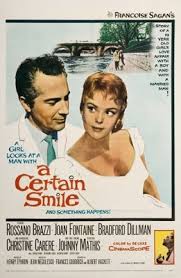
A CERTAIN SMILE
US, 1958, 104 minutes, Colour.
Rossano Brazzi, Joan Fontaine, Bradford Dillman, Christine Carere, Eduard Franz, Steven Geray.
Directed by Jean Negulesco.
A Certain Smile was written by the husband and wife team of Frances Goodrich and Albert Hackett. They had a long and prolific career with such films as Father of the Bride, Father’s Little Dividend, Easter Parade. However, they won Tony awards for The Diary of Anne Frank which was then made into a film in 1959.
A Certain Smile is something of soap opera, the popular kind of romance that director Jean Negulesco was directing at this time. He had been directing rather tough melodramas in the 1940s at Warner Bros including Three Strangers, Humoresque, Johnny Belinda. After he moved to 20th Century-Fox? in the 1950s with Three Came Home and The Mudlark as well as a version of Titanic, he moved into the Cinemascope era with such pleasing films as How to Marry a Millionaire, Three Coins in the Fountain, Woman’s World, Daddy Long Legs and The Rains of Ranchipur. He directed The Gift of Love, Count Your Blessings, The Best of Everything in the late 1950s.
The film focuses on Christine Carere as a young student at the Sorbonne. She is engaged to a young man, played by Bradford Dillman. However, she is attracted by her uncle, Rossano Brazzi, who is unfaithful to his wife, charmingly played by Joan Fontaine. They begin an affair …
The film is based on a story by Francoise Sagan whose more popular story, Bonjour Tristesse, was also filmed at this time with Jean Seberg. These were the popular stories that would become part of big-budget melodramas eventually miniseries in the 1970s.
1. The meaning of the title, whose smile? the tone of the title and its irony? the overtones of the song and its lyrics?
2. Should the film have used such colourful backgrounds, wide screen colour, lush fashions and high society? Was the story lush in itself or was it brittle? The importance of the tone given by Johnny Matthis's song and its insertion into the film?
3. How successful was the narrative device? In involving the audience? The French atmosphere of the film and its locations? The American accents of some of the actors?
4. How real was the story? How unreal was it? For what audience was the film made? Was it specifically geared to female audiences? Why? Why are films like this called soap opera? Do they portray real behaviour?' Real motivation? The background of a rich and affluent world? Nevertheless, how do soap operas affect audiences and portray basic values that they respond to? In this case, how successful a soap opera was the film?
5. Could audiences identify with Dominique? The sequences at home, her parents upset at her the death, the portrayal of life at school? Her serious background and her study, her nervousness? Her initial relationship with Bertrand? Her initial reaction to Luke, the dinner, the kiss in the garden? Were the struggles of her emotions credible? The influence of Francoise on her, Francoise taking care of her and her mother, the fact that she was Luke's wife? The importance of her not seeing Luke and Bertrand? Her inability to sort out her emotions? The going to the nightclub and the effect on her? Her listening to Luke’s proposition? Her immediately going to Bertrand and trying to resolve the crisis without thinking? The importance of the sequences at home as Bertrand arrives and her mother responds unfavourably? Why did she say yes to the weak Luke? The effect of the work on her? So girlish, he bored? The truth of their relationship? Her going to Paris on impulse? The impact of Bertrand's discovering the truth, and her discovering Luke's fickleness? Was the sequence of her wandering credible? Francoise’s kindness at her attitude, not forgiving her easily? The possibility of relationship with Bertrand? what future did she have? How real was this portrayal? The emotional infatuation? Any insight into a girl in these circumstances?
6. How successful was the portrayal of Luke - as a lover, full of charm, shallow, his deceptions? The effect on Dominique? Did she change him at all? The importance of the finale and its confrontation with Francoise? Francoise accepting him back? His look to the future? Would their relationship last?
7. How attractive was Francoise – sophisticated, kind, so easily hurt by Dominique and Luke, understanding the truth, able to forgive them both? Was she a credible and admirable character?
8. Bertrand, how credible, in his work, relationship with his mother, love for Dominique, how dependable? His impact at Dominique’s home, his discovery of the truth, his willingness to forgive her? Would they have a happy marriage?
9. How well portrayed were the issues of love, infatuation, sexuality, their impact on life?
10. How real were these issues and their communication via soap opera?
Published in Movie Reviews
Published in
Movie Reviews
Tagged under
Saturday, 18 September 2021 19:23
Catlow
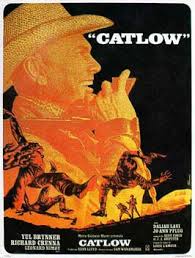
CATLOW
US, 1971, 108 minutes, Colour.
Yul Brynner, Richard Crenna, Leonard Nimoy, Jo Ann Pflug, Dahlia Lavi, Jeff Corey, David Ladd.
Directed by Sam Wanamaker.
Catlow is a typical western of the early 1970s. It has a great deal of violence – although it also combines a sense of humour.
The film is a star vehicle for Leonard Nimoy – who had made such an impact as Mr Spock in the Star Trek series and was to continue to do so over many decades. Nimoy also became a film director with such films as Three Men and a Little Lady.
1. How enjoyable a western was this? a typical western? In what way? Characters, situations, conventions, cliches?
2. Was the film too violent or did it integrate its violence? How humorous was the film? Did it take itself seriously enough? The peculiar blend of violence, humour, western traditions?
3. Were the characters and their situations real? Were they too conventional? Types of heroes, villains, heroines? Cowboys and individuals, the Mexicans?
4. How well did the film use the chase convention? Jed as continually being chased? Ben as a pursuer? Miller as a pursuer? the Indians pursuing, the Mexicans pursuing? How interesting are chase films? how did the screenplay use variations of, the chase genre?
5. The opening with cowboys and Indians? Were the Indians well integrated into the film? Was there anything about the Indian situation and the relation to the cowboys? The danger of Indians , Bent, being wounded?
6. What made Jed Catlow tick? His role in the war, his confrontation of villains, his success with guns, his outwitting others? His relationship with Bent, his love for Rovita? being tricked, his continued sense of humour?
7. What made Bent tick? His sense of justice, the law, right and wrong, his gratitude to Catlow for help? His pursuit of Catlow? How sympathetic a person was he? Was he a well-rounded figure in the film?
8. How successful a villain was Miller? His sneers and snarls? Was this overdone? Why do such villains as exist in the West ? Did he suffer too much violence? In his death?
9. How conventional a character was Rosita? Were you surprised at her robbery?
10. Was Christine an interesting character? Just for the romance?
11. Which incidents made the most impression? Why? The use of western locations and conventions?
12. What were the implications of this westem for the situations of the West? For audiences’ appreciation of westerns?
Published in Movie Reviews
Published in
Movie Reviews
Tagged under
Saturday, 18 September 2021 19:23
Ceremony, The / Gishiki
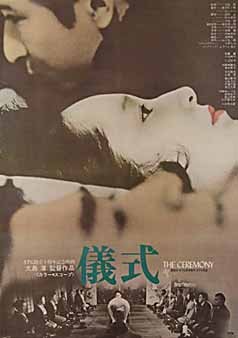
GISHIKI (THE CEREMONY)
Japan, 1971, 123 minutes, Colour.
Directed by Nagisa Oshima.
The Ceremony is an impressive film by the prolific Japanese writer-director Nagisa Oshima. In this film he looks back at the history of Japan in the previous thirty years or more. He looks at the solemnity of Japanese life and its rituals before the war, the war in Manchuria, the effect of World War Two, the immediate aftermath as well as looking at life in Japan in the 1950s.
He takes the opportunity to look at manners, mores, morals. This is associated very much with the rather reserved manner of the Japanese, the strict traditions from the time of the emperor, the transition from the rule of the emperor to the contemporary period and the effect on relationships, love, marriage, sexuality, death.
Oshima became notorious in the 1970s with his two rather frank films, The Empire of the Senses and The Empire of Passion. He directed an international cast led by David Bowie and Jack Thompson in the World War Two film, Merry Christmas Mr Lawrence.
1. The highlighting by the title of the whole theme of the film? Ceremonies as a time when special characteristics of the Japanese spirit are revealed? The ceremonies of marriage and death? The significant selection of these ceremonies, the emphasis on the sixties?
2. The film's use of colour, widescreen, atmosphere and style? The meticulous presentation of the ceremonies?
3. The structure of the films the journey and the suspense about the death? The flashbacks to significant ceremonies? Audience response to this partial and contrived view of a Japanese family?
4. The initial presentation of Japan of the seventies? The westernized look, the Japanese background? The indications of the family in the conversations of Masuo and Ritsuko? The nature of their relationship? The significance of the journey they are on? Anxiety, phone calls, tickets?
5. What did the film highlight about the significance of Japanese families? The theme of families and dynasties? Influences throughout the generations? The varieties of love and hatred? Marriage, sexual relationships? Relations and the intertangle of their relationships? How well did the film visualize this sense of family? Its inbred nature, its destructive aspects?
6. The film's emphasis on death and the ceremonies and rites associated with death? The number of violent deaths? The Increasing number of violent deaths through the generations? War, suicides, the death wish inherent in the Japanese way of life and these families? The audience left with the death wish at the end?
7. How was the history of this family a history of modern Japan from the forties to the -seventies? Comment on each of the periods visualized and their meaning for Japan? Comment on the gradual westernization of Japan as seen during these decades? What did this say about Japan's status in the modern world? Traditional Japanese coping with this?
8. The initial flashback to memories of war, Japan in Manchuria, Tojo, the Emperor renouncing his divinity, the effect on loyal Japanese, even to suicide? War crimes, Japanese fleeing Manchuria, even killing younger children? The impact on the people who escaped? The spectres of guilt and survival hanging over post-war families?
9. 1947 and the return from Manchuria? The ceremonies at the anniversary of the father's suicide? Comment on each of the persons present at the ceremonies, their dominance in the family, their subjugation to the grandfather and patriarch? His hold over them all? The significance of the memories of the war, Japanese pride, facing the future?
10. The transition to 1952? The baseball atmosphere of Japan? Masuo growing up? His infatuation for his aunt, Setsuko? Her praising him for example at the baseball? Masuo’s growing in love with Setsukov, and his realization of the incestuous overtones of this? What was being revealed about the next generation of the family?
11. Comment on each of the younger generation: Ritsuko and a Japanese girl growing up, Tadashi, the younger boy, his place in the family, his future? The importance of Terumichi? His place in the family? Relationship to Masuo and Ritsuko? Terumichi’s love for the aunt?
12. 1956 and ten years after the war? The impact of Masuo’s mother's death? The sexual relationship with his aunt? His relationship with the other generation? How had he changed?
13. The violence of Tadashi’s death and the ceremony, Masuo’s melodramatic reaction, the effect on Ritsuko?
14. The mock-marriage of Masuo? The absurdity of Japanese ritual carried out in extreme formalism? The effect of this?
15. The characters who went berserk? Madness Inherent in this way of life?
16. The impact of the grandfather's death? The impact of Masuo’s taking over the firm? The death of the imperialistic capitalist? The contrast with the pro-communist members of the family?
17. The communist uncle's marriage and its formalism? Japan toying with socialism?
19. The significance of Terumichi’s suicide? The reasons for this? His betrayal of Masuo and Ritsuko? The meaninglessness of his life? The younger Japanese death wish? The ending with Masuo and his memories on the beach? What had happened? Is this a fatalistic outlook on life? The pessimism of the film?
20. The insight into society and its values, religion and the lack of religion?
21. Themes of death, suicide, violence? Does this film deserve status as a classic?
Published in Movie Reviews
Published in
Movie Reviews
Tagged under
Saturday, 18 September 2021 19:23
Cavalcade
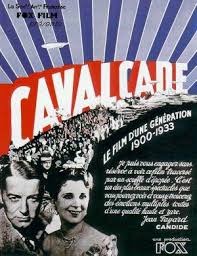
CAVALCADE
US, 1933, 110 minutes, Black and white.
Diana Wynyard, Clive Brook, Una O’ Connor, Herbert Mundin, Beryl Mercer, Ursula Jeans, Margaret Lindsay.
Directed by Frank Lloyd.
Cavalcade is based on a play by Noel Coward, who during the 1920s and 1930s wrote a number of very popular plays like Private Lives, Hay Fever. He also wrote patriotic material – including This Happy Breed and dramas like Brief Encounter.
The film was directed by Frank Lloyd and won him an Oscar for best director. The film also won Oscars as best film of 1933 and for art direction. British star Diana Wynyard was nominated as best actress.
The film uses the motif of families, upstairs and downstairs families, in London to trace the history of England from 1899 to 1933. This meant that it gave an overview, from a British perspective, of the turn of the century, the end of the Victorian era, the Edwardian era, World War One and the 20s leading into the Depression.
The film was very popular at the time – and has been imitated in many films since – many directors collaborated in 1942 to produce a similar kind of film, covering a much wider range of years, to provide morale-boosting for the British. This was Forever and a Day.
1. The film received the Oscar for best picture of 1933. The merit of the film, its impact then and now? Does it have the atmosphere of a classic?
2. The techniques of early sound films? An American film on England? The English acting, the style of photography, sets? The technique of collages for the passing of time? The use of music, songs?
3. The image of the cavalcade as used? The pageant of English history? The film’s attitude to history and its visualizing? How well was this British history illustrated?
4. The attitude of the film-makers towards history? The historical events, the effects on countries and people, the unpredictability? The question of survival?
5. The optimistic tone of the film: the fact that people and families can keep going? The contrast with pessimism of wars, deaths, selfishness, change? The strong emphasis of twentieth century blues at the end of the film?
6. Trace the change in England from the late nineteenth century and the Boer War to the thirties. The varying influences? The styles of living? English tradition changing, being lost?
7. How much did Britain change in 35 years? Why?
8. The Marryot family as typical of the English of the time? Aristocracy, their values, interests, their way of life? How sympathetic? How well drawn were the individual characters?
9. The comparison of the Marryots with the Bridges? The 'upstairs/ downstairs' contrast? The characters of the Bridges and their relationship to their meters? The varying interplays of contact between the two? The Bridges emerging from a 'downstairs’ situation to independence? The irony of the later encounter between Joe and Fanny?
10. Comment on Noel Coward's outlook on aristocracy and the working classes, the impact of this distinction now? How did it change during the period of this cavalcade?
11. The strong presentation of the Boer War in the film? The sentiment as people went to the war? The music accompanying the going to war? The equalizing of upstairs and downstairs? Sharing; worry? The strong farewells? The children and their war-games? The siege of Mafeking? The theatre sequence and the good news about the siege? The impact of the return of all the soldiers? And their families?
12. The significance of the death of Queen Victoria? The and of the Victorian era? A new century? The visual details of the funeral and its mpact on people?
13. The film’s comments on the first decade of the twentieth century, ways of life in the two families, children growing up, social calls, visits, the life of the Bridges in the pub? The memories of the war?
14. The significance of the seaside episode? The meeting? Fanny and her dancing?
15. The use of the Titanic as a symbol of the Edwardian period? The marriage and its happiness? Disaster and the death of the technological development?
16. The dramatic impact of the collage of war? Its significance for the themes of the film?
17. Joe and Fanny in the war period? The change of style of life? Fanny as a showgirl? Joe as the soldier? The reaction of the parents and the past traditions?
18. The sour look at the twenties? The significance of the lyrics and music of the Twentieth Century Blues?
19. What prospects did the film hold for the thirties? For the future? The contrast decades later? Modern nostalgia about the past?
20. What is the value of looking at this kind of cavalcade? How much understanding of history and people?
Published in Movie Reviews
Published in
Movie Reviews
Tagged under
Saturday, 18 September 2021 19:22
Caught
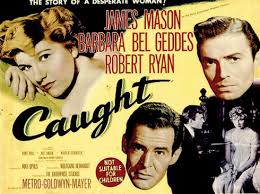
CAUGHT
US, 1949, 88 minutes, Black and white.
James Mason, Barbara Bel Geddes, Robert Ryan.
Directed by Max Ophuls.
Caught is one of the American films by French director Max Ophuls. It is a melodrama, made at the same time as his films The Reckless Moment and Letters from an Unknown Woman. James Mason, the star of The Reckless Moment, appears also in this film. It is one of his earliest American films.
The film is a melodrama as well as a symbolic exploration of the American dream – becoming a nightmare.
1. The significance of the title, its references to each character? Significance of themes?
2. The black and white photography, the style of the 40s, Max Ophuls as a classic director, his style?
3. The impact of the film as melodrama? plot, characterisation, the crises, the credibility of the ingredients?
4. The impact of the film as a symbol of American society?
5. The film’s focus on Leanora: symbol of American dreams, nature of her dreams, girlish, the Dorothy Dale school and its style, his saving money, changing her name, rehearsing for success, her modelling? The ingredients of the American dream manifested in Leonora?
6. The fairytale nature of the marriage? The chance encounter, hero worship. the goal of money. newspaper headlines, long Island sight?
7. Transition from dream to nightmare and the effect on Leanora? Comment on the visual symbols of Smith's growing hatred? The clashing of the party and the showing of the film?
8. The paranoia of Smith? part also of the American dream? The psychiatrist, psychosomatic illness, money, power, the capacity to hurt? Smith's power to do what he liked?
9. How credible was the clash and its presentation? The nature of love turned to hate?
10. The contrast of Larry? How was he compared with Smith? Values, work, poverty, kindness?
11. The film’s presentation of Long Island versus Harlem? The people, work, challenge? Leonora’s entry into this world and its effect on her?
12. The seeking of true happiness? Leonora and Larry? Leonora’s self-sacrifice and change of attitudes? The proposal?
13. The final clashes and their visualisation? A triangle of love and hatred? The American dream leading to violence?
14. How satisfying was the solution? Appropriately optimistic? The impact of the total film?
Published in Movie Reviews
Published in
Movie Reviews
Tagged under
Saturday, 18 September 2021 19:22
Catherine the Great
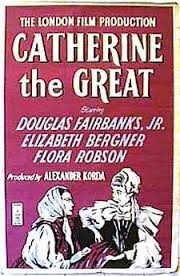
CATHERINE THE GREAT
US, 1934, 95 minutes, Black and white.
Douglas Fairbanks Jnr, Elisabeth Bergner, Flora Robson, Gerald du Maurier, Irene Vanbrugh.
Directed by Paul Czinner.
Catherine the Great was also called The Rise of Catherine the Great. It is a biography of the famous empress up to the time she ascended the throne of Russia. She began life as a German princess and was to be married to the Grand Duke Peter (here played by Douglas Fairbanks Jnr). Catherine is played by Elisabeth Bergner who worked as an actress in Austria moving to England and then to Hollywood after leaving Germany because she and her husband, the director Paul Czinner, were Jewish. She did some work in Hollywood but later returned to England (appearing in the horror film Cry of the Banshee in 1970) but working in German language film, theatre and television. Flora Robson appears as the Empress Elizabeth of Russia.
Catherine the Great represents the ascendancy of Russian empire in the 18th century. She was portrayed in a 1935 film by Marlene Dietrich with much more force, The Scarlet Empress, directed by Josef von Sternberg. There was an attempt to make a Russian version of Catherine the Great in the Soviet Union in 1940 with celebrated German actress Zahra Leander but it was not finished. There was a 1960s film with Jeanne Moreau as Catherine, Great Catherine.
There was a television version of the story of Catherine the Great in 1995, a two-part miniseries telemovie with Catherine Zeta-Jones? in the central role – before she became famous.
1. An interesting historical film? A big budget lavish feature of the early thirties? Impact then, now?
2. The interest in Catherine the Great in films of the thirties? Later? The cinema treatment of history, romance? Audience interest in seeing the re-creation of a period: the visuals, characters, historical and human themes?
3. The background of 18th. century marriages and politics? The effect of these on countries, treaties, personalities? The impersonal nature of the marriages? Themes of power, cruelty, love and lust? As background for the reign of Catherine the Great?
4. The film's highlighting of Peter and focusing on him? Douglas Fairbanks and his personality and style? His role in the kingdom under his aunt? Melancholy, the opening scene at the lodge with its artificial merriment, his returning to the lodge and withdrawing? A man of erratic moods, a kind of madness? His refusing to marry Catherine and the ironic meeting her accidentally? His love but yet his suspicions? His being easily influenced by advisers and misunderstanding people? His rudeness on the first night, the separation? The Countess Elizabeth? His attraction to Catherine and yet his fear and dislike of her? The re-meeting and the telling of the truth after the stories of the lovers? The importance of the Empress' death and its effect on him? The power-madness as compensation, his tyranny? The insupportable state of rule In Russia? His rest and his shock? His realization that Catherine had taken over and his ironic final comment about her? The information about his death? How interesting a historical portrait of a Russian ruler?
5. The 18th century marriages and Catherine’s background in Prussia, her mother, the changing of names? Her being forced? Her reaction to being unwanted?
6. The Empress Elizabeth and her toughness, her rule in Russia, devotion to work, being called a whore? Catherine and her relating to Elizabeth and learning from her? Peter and his reaction to his aunt? Her attitude towards his madness and her treatment of it The need for a wife and heir? The importance of her presence at the dancing and dancing to death?
7. Catherine and her reaction to neglect? Peter and the contrast and living with the Countess? The device of the story of the affairs and the mutual reaction? How much truth in this, how much was the screenplay a whitewashing of facts? Indication of Catherine's future behaviour?
8. The loyalty of the soldiers and the military to Catherine? Their helping her in her takeover?
9. The manner of the takeover - was it credible on Catherine's part? The counterpoint to Peter's decline and arrest? Her happiness that she was loved and that she would become Empress? Her reception by her attendants, the news of Peter's death and her reaction? Her final quoting of Peter's word about her?
10. The ambiguity of politics in the 18th century, ambitions, personalities changing because of circumstances and pressures? The artificial relationships? The expectations of monarchs in the 18th. century? The film as a thirties interpretation of this? Audience response now to the atmosphere of the thirties in treating historical films this way? The quality of Elizabeth Bergner's performance as Catherine - as a credible princess, as the future Empress of Russia?
Published in Movie Reviews
Published in
Movie Reviews
Tagged under
Saturday, 18 September 2021 19:22
Cat From Outer Space, The
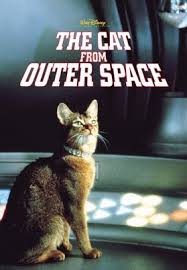
THE CAT PROM OUTER SPACE
US, 1978, 104 minutes, Colour.
Ken Berry, Sandy Duncan, Harry Morgan, Roddy Mc Dowell, William Prince, Alan Young, Hans Conreid.
Directed by Norman Tokar.
Typical Disney material of the late seventies - a take-off from 'Close Encounters of the Third Kind'. Advertising called it A Close Encounter of the Furred Kind. It uses the background of interest in outer space and flying saucers - with the irony of the alien pilot being a cat. The plot is enjoyable and has the added spice of spies with a bumbling Roddy Mc Dowall. However, the special effects are the main things - which The Cat from Outer Space is able to achieve by a powerful collar. There is a good plane and helicopter chase at the end. Vintage Disney material and reflecting the audience enjoyment of the seventies.
1. An enjoyable Disney film? The Disney formula for entertainment drama, espionage, comedy, animals? How good was the blend?
2. The themes reflecting the interests of the seventies, Close Encounters of the Third Kind? how comic a treatment of space themes, how sophisticated the presentation for Disney comedy?
3. The importance of the special effects for delight, for comedy?
4. The background of UFOs, interest in the exploration of space, aliens? Audience sympathy for this? The presentation of the American military and their attitude? The irony of the alien being a cat with an American accent?
5. The film relying for its success on the cat? his name, humanizing him, his extraterrestrial powers? His becoming Jake and much more American? his presence at the meeting, using his powers to open doors? Interest in Frank, the comedy with Link, the attraction towards Liz and her cat? His altering the horse race, the goal-kicking, the pool game? helping Frank fix the space ship? The comedy routines with Link? His heroism at the end? How well did the film create a personality for the cat - making him the hero and audiences identifying with him?
6. Frank as the human hero in comparison? The genial scientist, heroics, amiable, attraction towards Liz, the comedy with Link, experiencing the cat's power especially in levitation. escaping with the jeep etc.?
7. How well integrated were the spies themes - the clumsy spy and his photographing, Mr. Olympus and his plans?
8. The particularly American tone of the film - high level meetings, scientists, computers, the generals? The satire on these?
9. How well executed were the raids, the use of the power to freeze pursuers, the final chase and gymnastics?
10. The comedy in the pool room and the betting?
11. The very American ending and Jake becoming an American citizen? Disney niceness? Themes of good and bad? Popular themes on a popular level?
Published in Movie Reviews
Published in
Movie Reviews
Tagged under
Saturday, 18 September 2021 19:22
Catch Us If You Can
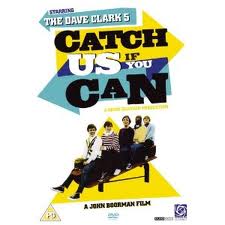
CATCH US IF YOU CAN
UK, 1965, 91 minutes, Black and white.
Dave Clark, Barbara Ferris, Lennie Davidson, Rick Uxley, Mike Smith, Dennis West Payton, Clive Swift, Robin Bailey, Yootha Joyce, David de Keyser, Michael Blakemore.
Directed by John Boorman.
Catch Us If You Can was released the same year as Richard Lester’s The Knack and the time of the Beatles’ films, A Hard Day’s Night and Help which this film in some ways resembles. The Dave Clark Five were popular at the time – though far less popular than the all-pervading Beatles.
This is a film of swinging London in the 1960s, television, commercials, the advertising industry and its exploitation of its stars. Barbara Ferris (who substituted for Marianne Faithful) is a model who runs away from a shoot with a stuntman (played by Dave Clark, the leader of the Dave Clark Five). Their journey throughout England provides copy for the advertising agency who exploits them.
The screenplay was written by Peter Nichols (Georgy Girl, A Day in the Life of Joe Egg, Privates on Parade). It was one of the earliest films of the celebrated director John Boorman who gave it quite some style. Boorman was soon to make Point Blank as well as a number of international films including Deliverance. He continued his career over the next forty years.
1. The impact of the film and its value in its time? Reflecting the mid-sixties and the trends of film making, popular cult culture, youth oriented films? Its impact now?
2. How valuable as a document of the times? A picture of pop culture?
3. How interesting and attractive the group? Interest in them as persons, their music, the film as a show piece for the Dave Clark Five?
4. The films presentation of their music, its use as background?
5. The importance of the individual style of the film, angle photography, editing, sense of motion etc?
6. The plot and its plausibility? The plot as a hanger for the film’s style, presentation of the characters, the comment on be times? The continuity of the plot?
7. The satire on the TV world, the making of commercials, the people involved, their manner of speaking? How effective the satire?
8. The heroine as attractive? Her role in the TV world? Running away for the day, her friendship with the boys? Yet her eye on a commercial career? Her being left at the end? The ethos and the irony of this?
9. The atmosphere of getting away, of not being bound, the difficulties of getting away because of contracts, people’s personalities and dominance? The visualising of the getting away, the various places they went, the holiday atmosphere, yet its ultimate futility? It was impossible to get away? People did actually get caught?
10. The significance of the army sequence, in itself, the comment on militarism, its impact on the characters?
11. The satire on the presentation of the middle aged couple? Their marriage, their attitudes towards the young people, their tendency to exploit? The nature of the satire?
12. The criticism of the media, the m anovaering of publicity, the e41oiting of people, especially by the kidnapping?
13. The significance of the party? The filming and its style? The bizarre kind of parody?
14. The ending - Lou as bad as all the others? The transition from naivety to cynicism? Comment on the film in terms of the medium is the message.
Published in Movie Reviews
Published in
Movie Reviews
Tagged under
Saturday, 18 September 2021 19:22
Catch Me a Spy
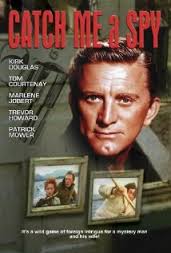
CATCH ME A SPY
UK, 1971, 94 minutes, Colour.
Kirk Douglas, Marlene Jobert, Tom Courtenay, Trevor Howard, Bernadette Lafont, Patrick Mower, Sheila Staefel.
Directed by Dick Clement.
Catch Me a Spy is a slight spy thriller from the early 70s, the period of many espionage films in eastern Europe (The Quiller Memorandum, The Criminal Letter). This film was written by Dick Clement who worked frequently with writer Ian La Frenais.
The film has a Romanian setting, double agents, British Secret Service, Russian spies. The strong cast give the film much more impact than it might have had with Kirk Douglas as the double spy, Marlene Jobert as the bewildered wife who tries to trap Douglas into helping her to find her abducted but falling in love with him, Trevor Howard as the uncle, Tom Courtenay as the head of the Secret Service.
1. Was this a good spy adventure? How much of the usual ingredients did it have? Were they used well and excitingly? The investigation, chase?
2. The film was filled with British irony. How effective and entertaining was this? In situation and dialogue?
3. Did the film contain real people and situations? or did it rely on pat figures and situations? If the latter, does this matter for this kind of film? Why?
4. How was Fabienne the central character of the film? How was the audience meant to identity with her? As the victim of the Russians? As the one who was in the dark? As the character who had to cope with the crises? How interesting and effective a heroine was Fabienne?
5. Comment on the way Fabienne was used for spy purposes? Even in her emotions and motives? How was her life changed by her being victimized?
6. Comment on the film’s view of international politics? Its picture of the British, especially with Dawson and the ministry and Clarke and the Secret Service? Britain’s willingness to exchange spies? Russia as the villain as manoeuvring to get prisoners back by false means? Of playing with people's emotions?
7. How interesting a character was John? The intricacy of his double game? His playing with Fabienne's affections? The irony of the exchange with the Russian spy (was this too ironic?) His final exposure and Fabienne’s wanting him and then discovering the truth?
8. Was Andrej an interesting character? Was he too enigmatic at the beginning? The fact that Kirk Douglas was playing him in his usual style? His menacing of Fabienne? Her managing to catch him as a spy for exchange? The gradual encounter with one another and its mysterious, ironical tone? Did his character develop or did he merely remain a stereotype? The relationship of the two, especially in the dangers and the chase? Their future together?
9. What did Clarke add to the film? The humour and jokes at the expense of the English? His emotional life? Fabienne's relationship with him?
10. How effective were the chases, especially the motor boat chases at the end?
11. Is it too pretentious to be seeking values in films like this? Are they merely entertaining? Or do spy adventures and comedies presuppose values in an audience: about life and death, truth and falsity, of using people for political ends?
Published in Movie Reviews
Published in
Movie Reviews
Tagged under
Saturday, 18 September 2021 19:22
Cat Creature, The
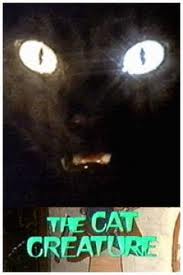
THE CAT CREATURE
US, 1973, 72 minutes, Colour.
Meredith Baxter, David Hedison, Gale Sondergaard, John Carradine, Stuart Whitman, Keye Luke.
Directed by Curtis Harrington.
The Cat Creature is an early American telemovie. However, it draws on the long tradition of mysterious cats in Hollywood films as well as the films of many cultures. In the 1940s there was the celebrated classic The Cat People and its sequel The Curse of the Cat People. There was also the 1940s horror film with Basil Rathbone, Bela Lugosi and one of the stars of this film, Gale Sondergaard, The Black Cat. There was also a remake by Paul Schraeder of Cat People.
Curtis Harrington directed a number of horror thrillers, especially for television, including another film about menacing cats, The Eye of the Cat, with Eleanor Parker.
This film is an updated variation on the theme – the investigation of the art collection of a rich man, an Egyptian amulet, a mummy, a thief, police investigations – and menacing cats.
1. How entertaining was this thriller?
2. What conventions of the horror film did it use? how well? The background of ancient Egypt? Modern atmosphere of superstition? Murder, the police? Did these ingredients blend well?
3. How atmospheric was the photography, the use of colour, city locations, menacing settings? Comment on the special effects, especially the cat and its hypnotising people, the violence and the girl as the cat?
4. What was the overall effect of this film? Fright, horror, superstition? How serious was the impact, how humorous?
5. How credible was the plot? The opening of the tomb, the removal of the necklace, the coincidences, the characters involved, their superstition, greed, murder? How conventional was the plot for a horror film?
6. Comment on the impact of the principal characters: the girl assistant in the shop who was murdered, her being fascinated by the cat and her suicide? The owner of the shop. her criminal background, her possessiveness of her assistants, her unwitting hiring of the cat woman, her greed for the necklace, her murder of the broker? The meaning of her death? Vengeance? The cat's murder of so many of the minor characters? The importance of the Egyptologist, his fascination for the cat woman, his reaction to the truth? The police inspector?
7. The impact of the opening, the inventory, the fascination with the jewellery, the mummy, the cat, the initial murder of the man taking the inventory? How well did the film build on this with its sense of menace and deaths?
8. How important was the confrontation between the hero and the cat woman? Her trying to persuade him to be immortal with her? Her vengeance and his warding it off by replacing the necklace?
9. How important were the themes of good and evil, superstition, immortality, the cat creature an the incarnation of evil?
Published in Movie Reviews
Published in
Movie Reviews
Tagged under